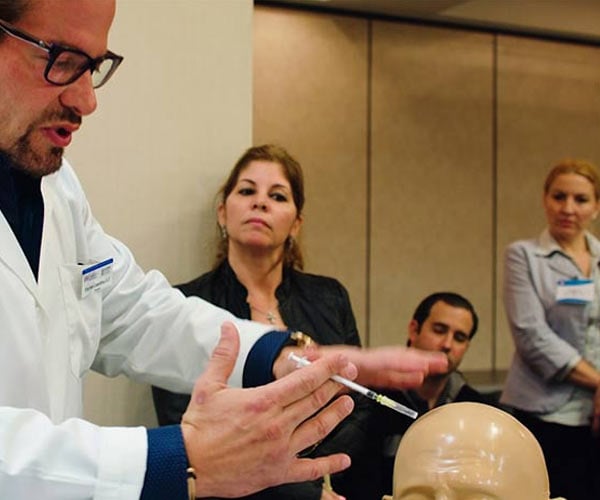Aestheticians vs. Estheticians: What's the Difference?
By Dr. Stephen Cosentino
PRESIDENT OF EMPIRE MEDICAL TRAINING
Only one letter separates aestheticians from estheticians. Just like “color” and “colour,” right — depends on your preference, and maybe where you learned English?
Not quite. Though the differences appear subtle at first glance, the gap between aestheticians and estheticians is much wider than a single “a”-sized space on the page. Each has a distinct role in the cosmetic industry.
Here’s what sets them apart.
Difference Between Aestheticians vs. Estheticians
Estheticians are cosmetic professionals who mainly perform topical skincare treatments in salons or spas. Although requirements vary from state to state, they usually don’t need to be licensed.
Aestheticians are licensed professionals who also perform cosmetic treatments. However, their duties are more varied and complicated, hence the need for licensure.
Both estheticians and aestheticians earn less than registered nurses and doctors. Average annual compensation is about $40,000 for both types of professional, though this varies by location, practice setting, and experience level.
Estheticians and aestheticians with more training or advanced credentials can earn much more. For example, nurse estheticians can make very good money. Those with advanced nursing degrees, such as nurse practitioner (NP) degrees, earn well over $100,000 per year on average, according to the Bureau of Labor Statistics.
What Is an Aesthetician?
An aesthetician is a cosmetic professional with formal aesthetician certification and state licensure. Depending on the practice setting and their experience level, their duties may include:
- Performing laser hair removal and other cosmetic laser procedures
- Performing tattoo removal procedures
- Doing chemical peels, microdermabrasion, and other advanced skincare treatments
- Managing other cosmetic and medical treatments as needed
What Is an Esthetician?
An esthetician focuses on cosmetic treatments, such as makeup application, topical skin treatments, and skin cleaning. As skincare specialists, they are experts in skin types and skin conditions. They may also perform massage and other spa services.
Estheticians and Medical Aestheticians — What’s the Difference?
In general, aestheticians are more likely to work in a medical or clinical setting. And aestheticians who focus more on the medical side of cosmetic practice may be known as medical aestheticians or medical aesthetics practitioners.
Estheticians are more likely to work in nonmedical spa or salon settings. However, aestheticians and estheticians may work alongside each other in medical spas. And estheticians-by-training can and often do obtain more advanced credentials that allow them to perform more advanced or “medical” treatments, including Botox and dermal filler injections.
Should You Become an Aesthetician or Esthetician?
It’s important to know the difference between aestheticians and estheticians even if you don’t work in medicine or cosmetics. You need to know which type of professional to seek out for your next cosmetic treatment, after all.
If you are considering a career change or evolution, which should you choose? Factors to consider include:
- Training. Esthetician programs usually take less time to complete and are considered less difficult to complete successfully. Medical aesthetician training programs may take longer and require a licensing exam.
- Career Opportunities. Estheticians and aestheticians earn about the same on average, but aestheticians working in clinical settings tend to have more room for advancement.
Practice Setting. Estheticians are more likely to work in salons or spas, while aestheticians may work in clinics. Salons and spas aren’t necessarily more laid-back than clinical settings, but some people prefer them.


